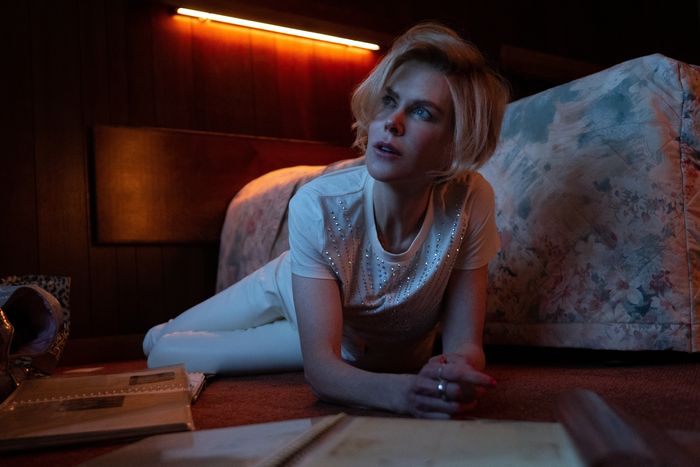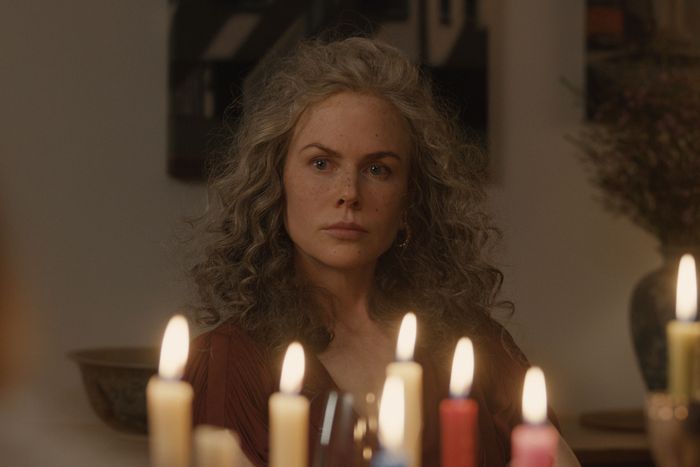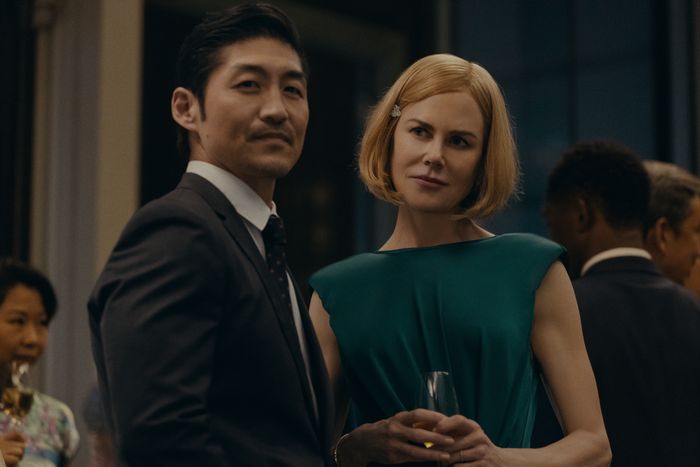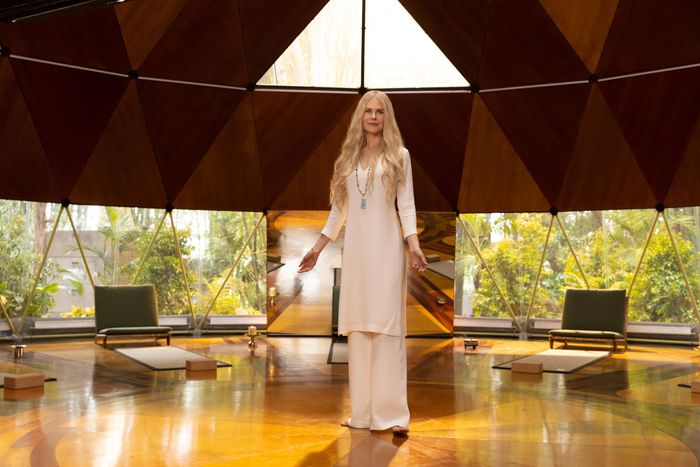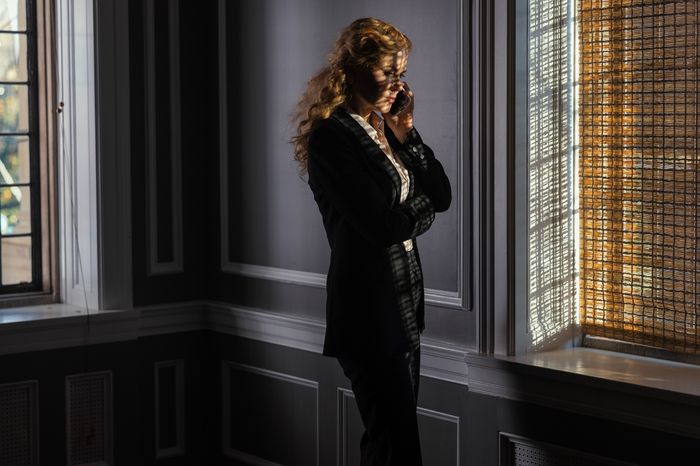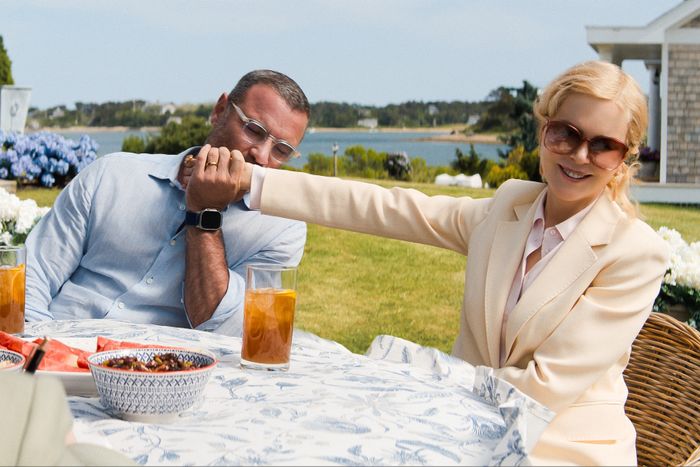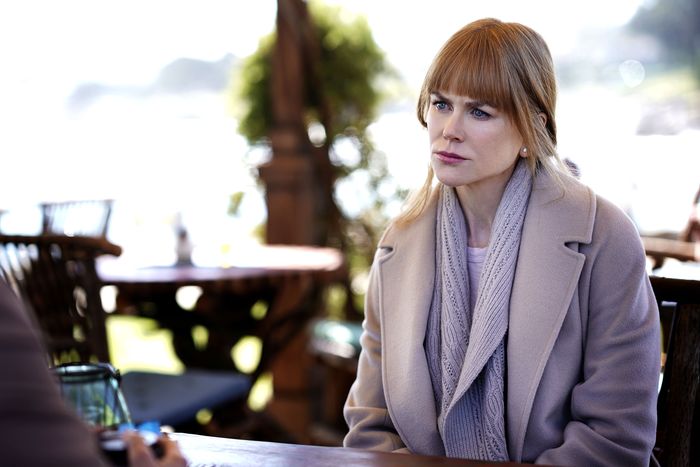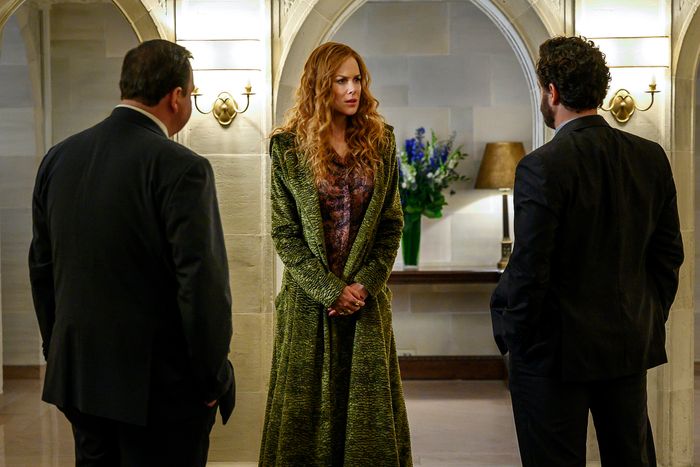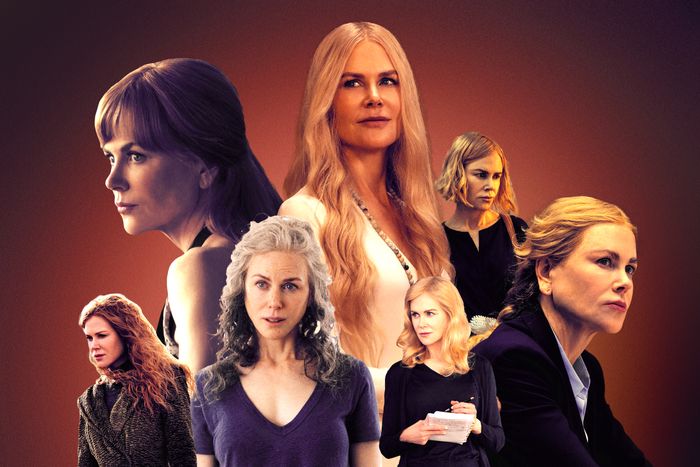
Nicole Kidman is one of the greatest movie stars we’ve ever had. Ethereal, regal, and a little weird, the Australian actor has made well over 80 films since the early 1990s. She has been a fixture in the public imagination just as long thanks to an early career powered by the gossip pages; a high-profile collaboration with her then-soon-to-be ex-husband, Tom Cruise, while they were at the peak of their stardom; and several cinematic reinventions since then. That she became meme legend status for an AMC Theaters spot, where she extols the virtues of cinema for an audience already in the cinemas, is only fitting; it has always been the high summer of Nicole Kidman.
Fascinatingly, Kidman has also blossomed into a television star in recent years. Since 2017, when she featured as part of the ensemble in David E. Kelley’s Big Little Lies, she has become one of the most visible A-listers on the small screen. She has a new show nearly every year, and can be found in at least one original series on the majority of the big streaming services. And thank goodness: Something sparkling happens when an actor of Kidman’s caliber dedicates herself so fully to translating the otherworldly grandeur of her iconography for television’s unique delights. Over the years, it’s become clear that the Nicole Kidman of television has a specific flavor: Her characters are often wealthy, elegant, stressed-out snobs in the upper echelons of society — though she has sometimes dipped into portraying characters in more modest life circumstances, to mixed results. But by and large, Kidman’s transition into television is marked by projects that play off her Galadriel-esque energy in the service of exploring darker truths.
Below, we rank the actor’s modern television roles based on a combination of how the show represents the Nicole Kidman TV Experience and the overall quality of the show itself. For our purposes, we’re practicing a specific definition of modern: Kidman came up on Australian television in the ’80s, before her breakthrough as a movie star with 1990’s Days of Thunder. She would lightly return to television with cameos in Sesame Street and Hello Ladies: The Movie, but we don’t count that. She also starred in the 2012 TV film Hemingway & Gellhorn, but that’s a movie, so it doesn’t count either. No, it was 2017’s Big Little Lies that marked the beginning of the true Nicole Kidman TV Experience that we’ve come to love.
8.
Roar: “The Woman Who Ate Photographs”
2022, Apple TV+
In this entry from Apple TV+’s anthology series of feminist parables, Kidman is a woman, Robin, who spends an extended stretch of time with her mother, played by Judy Davis, as they take an overnight road trip. Robin is in a tough spot in life. Her mother, already difficult, is struggling with dementia, hence the road trip, which is meant to resettle her into Robin’s home. As she grapples with the prospect of slowly losing her mother, she’s also dealing with her older son’s imminent departure for university, which causes her to feel further adrift. So she copes by eating photographs, naturally, which allows her to briefly experience the scene contained in the picture.
Yeah, it’s a weird conceit to pursue the episode’s themes of memory, but “The Woman Who Ate Photographs” is a short story that doesn’t really need to explain itself. As a character, Robin represents the greatest distance from the moneyed archetypes that typically define Kidman’s television roles: Robin lives in a modest house in the suburbs, where she’s married to the affable rough-and-tumble Simon Baker, but Kidman does rock a wig that takes the form of oddly perfect ’80s-inspired short hair. Robin is the least interesting TV Kidman, but “The Woman Who Ate Photographs” does repeatedly give us the indelible image of Kidman scarfing down old Polaroids like Cheetos.
7.
Top of the Lake: China Girl (Sundance TV, 2013)
2013, Sundance TV
Jane Campion’s follow-up series to Top of the Lake is widely, and rightfully, considered inferior to its predecessor, principally for the sin of making explicit what was poetically implicit in the first season and for never quite acknowledging how weird, contrived, and plain confusing it is. Consider Kidman’s character, Julia Edwards, who starts out the story in the middle of a divorce from her husband, Pyke, with whom she has an adopted daughter, Mary, who had been given up 17 years earlier by Robin Griffin, the Sydney detective played by Elisabeth Moss, who serves as the show’s main protagonist. Mary also turns out to be romantically involved with Puss, a skeezy German whose brothel happens to be the site of the big crime that Robin ends up investigating … it’s a whole thing. Everything’s connected, man!
Kidman is largely secondary to the action in China Girl, but as is her custom, she continues to push the makeup department to its limits. As Julia, Kidman is wigged up with gray curly hair that wouldn’t look entirely out of place in Hocus Pocus, and it frames a face dotted with freckles, a nose altered by a prosthetic bulge, and fake teeth anchored by a noticeable gap. It’s quite the transformation, and one of the few truly memorable qualities in this otherwise forgettable season of television.
6.
Expats
2024, Amazon Prime Video
Created by The Farewell’s Lulu Wang, Expats is a lugubrious drama about two women — Kidman’s finance wife, Margaret, and Ji-young Yoo’s younger, wayward Korean American Mercy — who are linked by tragedy when the latter’s negligence results in the disappearance of the former’s child. There’s also a third expat in the mix, Hilary (Sarayu Blue), who’s an estranged friend of Margaret’s, but her problems are more existential and she’s kind of incidental to the central despair. Expats is a bit of a mess, a shambolic drag that cosplays Wong Kar-Wai melancholia while performing perfunctory class criticism, but the Prime Video series does have two things going for it. First, its gorgeous Hong Kong setting is sumptuous to take in, though this pleasure has been made complicated by the political sensitivities surrounding the city in the years since the production was shot. Second, Kidman gives a compelling performance as a woman thoroughly destroyed by the loss of her child. The way her character’s wealth factors into this has a touch of the absurd: In notoriously expensive Hong Kong, she rents out a pied-à-terre specifically dedicated for grieving purposes. For Kidman, even sadness is glamorous.
5.
Nine Perfect Strangers
2021, Hulu
Kidman went Method for this one, which makes sense. It was filmed during the pandemic, and you too would want to just be a whole other person for an extensive stretch. Nine Perfect Strangers sees her adopt a nigh-intelligible Eastern European accent as she portrays Masha, the guru of Tranquillum House, a boutique wellness resort promising a transformative healing experience through, shall we say, unconventional means. (Drugs and what can be legibly described as psychological torture factor into the proceedings.) This Hulu series is the weakest of the three Kelley shows featuring Kidman, with a meandering narrative that doesn’t really drive toward anything satisfying, and in its time, it definitely suffered from paling in comparison to the similarly resort-themed The White Lotus, which it debuted right after. But something has to be said about what Masha allows Kidman to do, which is to channel the actor’s natural ethereal energy into a cult-leader-like figure who ambiguously drifts between comforting, mysterious, and downright unsettling.
4.
Special Ops: Lioness
2023-current, Paramount+
Speaking of a character who’d step on your neck, here’s Kaitlyn Meade. Kidman’s TV métier usually involves the upper strata of wealth, but with Meade she gets to wield a different kind of power: that of the American security state. In the world of Special Ops: Lioness, Meade is a part of the American superstructure: a senior-ranking CIA official who’s married to a billionaire (so don’t worry, she’s still rich) and particularly adept at working senators — all while she manages Joe, a hard-charging operative played by Zoe Saldaña. Kidman might not initially seem like a great fit for the ever-growing Taylor Sheridan Universe, and to be sure, there’s a slight dissonance in watching her spout Sheridan’s dick-swinging dialogue. (“When we want to hear you speak, we will tell you to fucking speak.”) Still, there’s a clear connection between the emblems of the American elite she tends to play and her role in Lioness, and it’s just plain fun to see Kidman as a shadowy CIA handler who’s all power suits and bons mots.
3.
The Perfect Couple
2024, Netflix
The Perfect Couple isn’t perfect. In fact, it’s a little too generic, like the “whole murder mystery with rich people” conceit was run through and flattened by the Netflix gourmet-cheeseburger machine. But hey, a cheeseburger still tastes good. This limited series, developed by Jenna Lamia and directed by Susanne Bier, has all the components of a mindless good time: There’s a Nantucket wedding, there’s a murder, and there’s a shady super-rich family and retinue who make up a stacked list of possible suspects. Kidman is pretty great as Greer Garrison Winbury, the wildly successful and very British author who sits at the center of it all. Her coiffed wig is a sublime oceanic wave of blonde, and her mode in this series is that of powerful matriarch, someone who, with the disposition of ice and steel, spends a great deal of time trying to contain the public fallout of a murder that threatens to ruin her family and her reputation. It’s a character that makes particularly good use of Kidman’s eyes: piercing, watchful, indiscernible.
2.
Big Little Lies
2017-2019, HBO
The first of Kidman’s collaborations with Kelley took Liane Moriarty’s beach-read banger, slapped on HBO’s prestige imprimatur, and generated an undeniable sensation by thoroughly mixing the highbrow with the lowbrow. More important, as Kidman’s first return to television after achieving movie stardom in 1990, Big Little Lies set the template for the Nicole Kidman TV Experience. Kidman’s Celeste Wright — a former lawyer now living under the stifling thumb of her abusive husband, Perry, played by a dependably terrifying Alexander Skarsgård — establishes many of the core tropes that would come to define how we tend to think of Kidman’s TV roles: a woman trapped in a prison of sterling wealth. Based on this contribution alone, one can reasonably make the argument that this show should sit at the very top of this list. Counterpoint, though: Big Little Lies is far too much of an ensemble piece — Kidman shares the tableau with Reese Witherspoon, Shailene Woodley, and (to some extent) Laura Dern and Zoë Kravitz, who all have their separate problems — to warrant top billing. Also, the second season wasn’t very good. Which leads us to …
1.
The Undoing
2020, HBO
The platonic ideal of the Nicole Kidman TV Experience. The Undoing reunites Kidman with her Paddington co-star Hugh Grant as she plays Grace Fraser, a glamorous psychologist and wife to Grant’s hotshot oncologist who steadily becomes undone when he is named the prime suspect in a murder of a mysterious woman. It’s got everything you want from Television Kidman: She’s an upper-crust socialite, she has a beach house, and she rocks a vast wardrobe of unbelievably opulent coats as the world she once knew completely melts around her. The Undoing also finds Kidman working with a mix of ingredients that suits her current tastes: It’s a Kelley joint, with Susanne Bier directing, and adapted from yet another rollicking page-turner, in this case Jean Hanff Korelitz’s You Should Have Known. Grant, working his first job in American television, is perfect both as a cad and slimy husband to the willowy Kidman; they combine to make the exact kind of Upper East Side, charity-ball couple you love to hate on TV. The Undoing was a smash hit for HBO in part due to providential timing, serving as primo-grade fever-dream escapism during the deep winter of the pandemic. But its success almost certainly had more to do with how it offered the pure, uncut Kidman.



